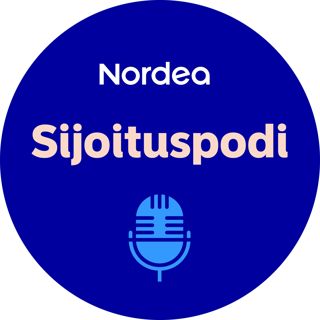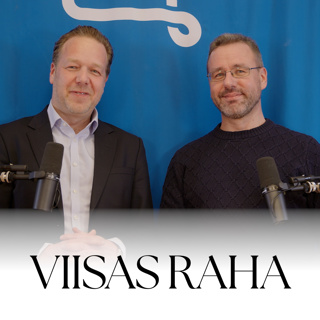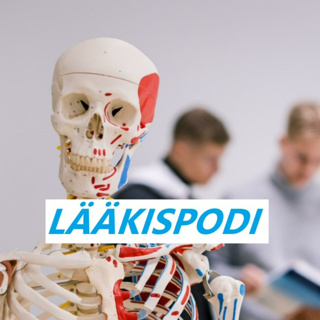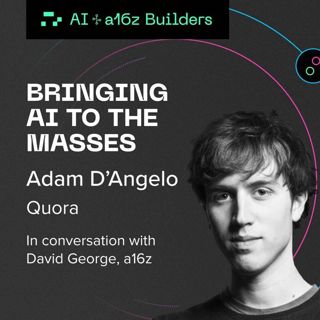
Bringing AI to the Masses with Adam D’Angelo
Generative AI has initiated a transformative shift, reshaping our world in unprecedented ways. In a16z's AI Revolution series, we engage some of the most impactful builders in the field of AI discussing and debating where we are, where we’re going, and the big open questions in AI.In this episode, General Partner David George chats with Adam D'Angelo, the CEO and founder of Quora, wade into this fast-moving AI landscape, and specifically touch on how building infrastructure for creators can democratize AI. Adam, who is now building AI aggregator Poe and is on the board of OpenAI, has long been paying attention to this AI wave. He recounts this evolving fascination, and together Adam and David explore the dynamic synergy between humans and AI, highlighting the critical role of experimentation for founders in the AI realm.As a reminder, this conversation comes from our AI Revolution series, which you can dive into more deeply at a16z.com/ai. Resources:Watch the the full interview: www.a16z.com/AIRevolutionFind Adam on Twitter: https://twitter.com/adamdangeloFind David George on Twitter: https://twitter.com/DavidGeorge83 Stay Updated: Find a16z on Twitter: https://twitter.com/a16zFind a16z on LinkedIn: https://www.linkedin.com/company/a16zSubscribe on your favorite podcast app: https://a16z.simplecast.com/Follow our host: https://twitter.com/stephsmithioPlease note that the content here is for informational purposes only; should NOT be taken as legal, business, tax, or investment advice or be used to evaluate any investment or security; and is not directed at any investors or potential investors in any a16z fund. a16z and its affiliates may maintain investments in the companies discussed. For more details please see a16z.com/disclosures. Stay Updated:Find a16z on XFind a16z on LinkedInListen to the a16z Show on SpotifyListen to the a16z Show on Apple PodcastsFollow our host: https://twitter.com/eriktorenberg Please note that the content here is for informational purposes only; should NOT be taken as legal, business, tax, or investment advice or be used to evaluate any investment or security; and is not directed at any investors or potential investors in any a16z fund. a16z and its affiliates may maintain investments in the companies discussed. For more details please see a16z.com/disclosures. Hosted by Simplecast, an AdsWizz company. See pcm.adswizz.com for information about our collection and use of personal data for advertising.
20 Maalis 202428min
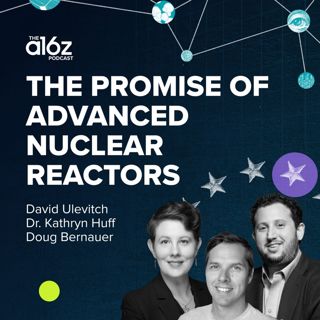
A Nuclear Comeback: Are New Reactors the Answer?
Nuclear energy accounts for 20% of the electricity in the United States, but remarkably, 2023 marked the commissioning of the U.S.'s first new nuclear reactor in over three decades. The past few years have been a story of changing public opinion, but equally, innovative startups crafting groundbreaking reactor designs and an ambitious announcement by the U.S. government to triple nuclear power production by 2050.In this episode recorded at a16z’s American Dynamism Summit in Washington DC, a16z podcast host Steph Smith is joined by a16z General Partner David Ulevich, Doug Bernauer – CEO of microreactor company Radiant – and Dr. Kathryn Huff, Assistant Secretary of the Office of Nuclear Energy.From energizing the country's data centers to propelling the electric vehicles on our roads or powering the factories crafting tomorrow's innovations, they discuss why expanding our nuclear capacity is a national imperative. Stay tuned for more exclusive conversations from a16z's second annual American Dynamism Summit in Washington DC. Topics Covered: 00:00 - The Promise of Advanced Nuclear Reactors03:43 - Nuclear Energy's Current Landscape07:00 - Vulnerabilities in Fuel Delivery10:30 - Nuclear Energy's Timeline12:11 - Portable Microreactors and Mass Production 15:06 - Nuclear Energy's Role in America21: 24 - Government's Role in Nuclear Energy26:08 - Challenges of Portable Micro Reactors 30:03- The Evolution of Nuclear Reactors32:11 - Nuclear’s Public Perception and Safety39:21 - The Global Need for Nuclear Power Resources:Learn more about American Dynamism Summit 2024: www.a16z.com/adsummitFind Dr. Kathryn Huff on Twitter: https://twitter.com/katyhuffFind Doug Bernauer and Radiant on Twitter: https://twitter.com/radiantnuclearFind David Ulevitch on Twitter: https://twitter.com/davidu Stay Updated: Find a16z on Twitter: https://twitter.com/a16zFind a16z on LinkedIn: https://www.linkedin.com/company/a16zSubscribe on your favorite podcast app: https://a16z.simplecast.com/Follow our host: https://twitter.com/stephsmithioPlease note that the content here is for informational purposes only; should NOT be taken as legal, business, tax, or investment advice or be used to evaluate any investment or security; and is not directed at any investors or potential investors in any a16z fund. a16z and its affiliates may maintain investments in the companies discussed. For more details please see a16z.com/disclosures. Stay Updated:Find a16z on XFind a16z on LinkedInListen to the a16z Show on SpotifyListen to the a16z Show on Apple PodcastsFollow our host: https://twitter.com/eriktorenberg Please note that the content here is for informational purposes only; should NOT be taken as legal, business, tax, or investment advice or be used to evaluate any investment or security; and is not directed at any investors or potential investors in any a16z fund. a16z and its affiliates may maintain investments in the companies discussed. For more details please see a16z.com/disclosures. Hosted by Simplecast, an AdsWizz company. See pcm.adswizz.com for information about our collection and use of personal data for advertising.
15 Maalis 202447min
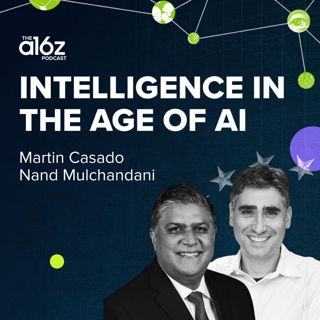
Intelligence in the Age of AI with new CTO of the CIA
Artificial intelligence has taken the world by storm. But despite the hype around personalized avatars or podcast language translation, artificial intelligence is not only impacting the creative spheres; in fact it’s hard to find an industry that isn’t being touched by this technology – and defense of our country is far from excluded.In this episode, originally recorded in the heart of Washington DC this January during a16z’s American Dynamism Summit, a16z General Partner Martin Casado and a16z enterprise editor, Derrick Harris are joined by the first-ever CTO of the CIA, Nand Mulchandani.In this wide-ranging conversation, they discuss the evolving relationship between analysts and AI, how governments can keep up with this exponential technology, and finally, how it’s impacting both offense and defense. This episode is essential listening for anyone interested in the intersection of technology, national security, and policy-making in the age of artificial intelligence. Stay tuned for more exclusive conversations from a16z's second annual American Dynamism Summit in Washington DC. Topics Covered:00:00 - Intelligence in the Age of AI02:28 - Rethinking Jobs and AI's Asymmetric Power05:00 - The History of AI in the Intelligence Community07:00 - Operational Utilization of AI10:40 - Analytic Capabilities and Uncertainty12:56 - AI's 'Hallucination' Concerns16:37 - Analyst Skill Sets and AI Tools26:29 - Supply Chain and Open Source31:35 - Public-Private Partnerships41:33 - Government as a Customer and Partner in Tech42:43 - Policy, Technology, and Regulation ResourcesLearn more about AD Summit 2024: www.a16z.com/adsummitWatch all of the stage talks at AD Summit 2024: https://www.youtube.com/playlist?list=PLM4u6XbiXf5pAKmk1AeZ9964KGScf4lHMRead the CIA’s announcement around the new CTO role: https://www.cia.gov/stories/story/cia-names-first-chief-technology-officer/Find Nand Mulchandani on Twitter: https://twitter.com/nandmulchandaniFind Martin on Twitter: https://twitter.com/martin_casadoFind Derrick on Twitter: https://twitter.com/derrickharris Stay Updated: Find a16z on Twitter: https://twitter.com/a16zFind a16z on LinkedIn: https://www.linkedin.com/company/a16zSubscribe on your favorite podcast app: https://a16z.simplecast.com/Follow our host: https://twitter.com/stephsmithioPlease note that the content here is for informational purposes only; should NOT be taken as legal, business, tax, or investment advice or be used to evaluate any investment or security; and is not directed at any investors or potential investors in any a16z fund. a16z and its affiliates may maintain investments in the companies discussed. For more details please see a16z.com/disclosures. Stay Updated:Find a16z on XFind a16z on LinkedInListen to the a16z Show on SpotifyListen to the a16z Show on Apple PodcastsFollow our host: https://twitter.com/eriktorenberg Please note that the content here is for informational purposes only; should NOT be taken as legal, business, tax, or investment advice or be used to evaluate any investment or security; and is not directed at any investors or potential investors in any a16z fund. a16z and its affiliates may maintain investments in the companies discussed. For more details please see a16z.com/disclosures. Hosted by Simplecast, an AdsWizz company. See pcm.adswizz.com for information about our collection and use of personal data for advertising.
11 Maalis 202446min
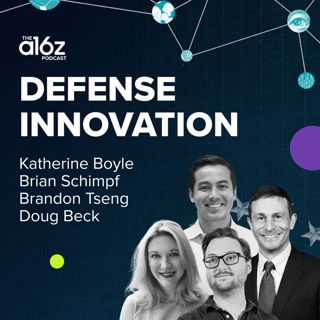
From Silicon Valley to the Pentagon: The Future of Defense Innovation
The last few decades have been a period of transition for defense. An increasing number of startups have begun to rival large defense primes, the industry has gradually become a calculus of both hardware and software, and exponential technologies have forced the DoD to rethink how it has traditionally done business.These changing conditions were some of the inputs to resulting in the DIU – Defense Innovation Unit – starting in 2015 within the Department of Defense, focused on accelerating the adoption of technology.In this episode recorded at a16z’s American Dynamism Summit in January, a16z General Partner Katherine Boyle is joined by the Director of the DIU, Doug Beck, plus two critical founders ushering in this new era of defense: Brian Schimpf, cofounder and CEO of Anduril and Brandon Tseng, cofounder of Shield AI.So what does the next wave of defense innovation really look like? Let’s find out. 00:00 - The Future of Defense Innovation 03:30 - The Defense Innovation Unit (DIU)05:45 - Adoption of Startup tech by the DoD07:42 - Acquisition, Budgeting, and Contracting13:17 - Traditional Primes vs Startups14:25 - Cost-Plus Fixed Fee Contracts20:11 - The Replicator Program22:26 - The New Threat Environment27:11 - Scale and Readiness for Modern Warfare32:15 - Procurement Reform and Feasibility39:30 - Success Metrics for Defense Resources:Learn more about AD Summit 2024: www.a16z.com/adsummitWatch Brian’s stage talk at AD Summit 2024: https://a16z.com/securing-americas-future-how-technology-companies-and-washington-are-building-a-safer-world/Watch all of the stage talks at AD Summit 2024: https://www.youtube.com/playlist?list=PLM4u6XbiXf5pAKmk1AeZ9964KGScf4lHMFind Katherine on Twitter: https://twitter.com/KTmBoyleFind Brandon and Shield AI on Twitter: https://twitter.com/shieldaitechFind Brian on Twitter: https://twitter.com/schimpfbrianFind Doug and the DIU on Twitter: https://twitter.com/diu_x Stay Updated: Find a16z on Twitter: https://twitter.com/a16zFind a16z on LinkedIn: https://www.linkedin.com/company/a16zSubscribe on your favorite podcast app: https://a16z.simplecast.com/Follow our host: https://twitter.com/stephsmithioPlease note that the content here is for informational purposes only; should NOT be taken as legal, business, tax, or investment advice or be used to evaluate any investment or security; and is not directed at any investors or potential investors in any a16z fund. a16z and its affiliates may maintain investments in the companies discussed. For more details please see a16z.com/disclosures. Stay Updated:Find a16z on XFind a16z on LinkedInListen to the a16z Show on SpotifyListen to the a16z Show on Apple PodcastsFollow our host: https://twitter.com/eriktorenberg Please note that the content here is for informational purposes only; should NOT be taken as legal, business, tax, or investment advice or be used to evaluate any investment or security; and is not directed at any investors or potential investors in any a16z fund. a16z and its affiliates may maintain investments in the companies discussed. For more details please see a16z.com/disclosures. Hosted by Simplecast, an AdsWizz company. See pcm.adswizz.com for information about our collection and use of personal data for advertising.
7 Maalis 202443min
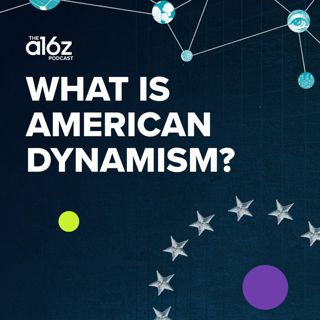
What is American Dynamism?
American Dynamism. A term coined by a16z General Partner, Katherine Boyle, two years ago, when she and David Ulevitch founded the firm's American Dynamism investing practice.Beyond a sector or movement, American Dynamism embodies innovation, community, and a unique philosophy touching every facet of American life.In this episode, we hear from 10 voices, including policymakers, founders, and funders, as they share what American Dynamism means to them. They discuss the critical technologies shaping the future and the challenges on the path to the next decade of dynamism. Stay tuned for more exclusive conversations from a16z's second annual American Dynamism Summit in Washington, D.C. Resources: Find Dr. Kathryn Huff on Twitter: https://twitter.com/katyhuffFind Nand Mulchandani on Twitter: https://twitter.com/nandmulchandaniFind Doug Beck and the DIU on Twitter: https://twitter.com/diu_xFind Mitch Lee on Twitter: https://twitter.com/dontmitchFind Ian Cinnamon on Twitter: https://twitter.com/IanCinnamonFind Doug Bernauer and Radiant on Twitter: https://twitter.com/radiantnuclearFind Chris Bennett on Twitter: https://twitter.com/8ennettFind Mike Slagh on Twitter: https://twitter.com/MikeSlaghFind Rahul Sidhu on Twitter: https://twitter.com/rahoolsidooFind Wyatt Smith on Twitter: https://twitter.com/wyatt_h_smithLearn more about American Dynamism: https://a16z.com/american-dynamism Stay Updated: Find a16z on Twitter: https://twitter.com/a16zFind a16z on LinkedIn: https://www.linkedin.com/company/a16zSubscribe on your favorite podcast app: https://a16z.simplecast.com/Follow our host: https://twitter.com/stephsmithioPlease note that the content here is for informational purposes only; should NOT be taken as legal, business, tax, or investment advice or be used to evaluate any investment or security; and is not directed at any investors or potential investors in any a16z fund. a16z and its affiliates may maintain investments in the companies discussed. For more details please see a16z.com/disclosures. Stay Updated:Find a16z on XFind a16z on LinkedInListen to the a16z Show on SpotifyListen to the a16z Show on Apple PodcastsFollow our host: https://twitter.com/eriktorenberg Please note that the content here is for informational purposes only; should NOT be taken as legal, business, tax, or investment advice or be used to evaluate any investment or security; and is not directed at any investors or potential investors in any a16z fund. a16z and its affiliates may maintain investments in the companies discussed. For more details please see a16z.com/disclosures. Hosted by Simplecast, an AdsWizz company. See pcm.adswizz.com for information about our collection and use of personal data for advertising.
4 Maalis 202430min
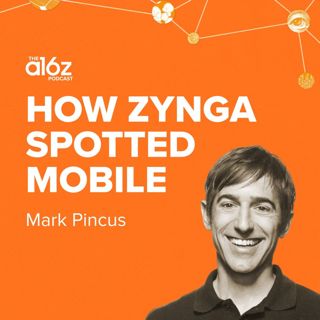
The Quest for True Signal: How Zynga Spotted Mobile
You might recognize the name Mark Pincus but we almost guarantee you recognize the game Farmville. Mark Pincus is the founder and longtime CEO of Zynga, known for its massive global franchise of games, including those household names like Farmville and Words with Friends. Zynga was also at the forefront of the transition to mobile and the use of large platforms like Facebook for distribution.In this episode Mark joins Josh Lu from the a16z Games team for a fireside chat. They discuss navigating major tech waves and recognizing "true signal" opportunities, and explore a wide range of topics, from the strategic insights that propelled Zynga to success, the future of the Metaverse, and the philosophy behind minimum viable products. This conversation offers invaluable insights for both gaming industry insiders and enthusiasts looking to understand the dynamics of tech innovation and entrepreneurship.Topics Covered:00:00 - How Zynga Spotted the Mobile Wave02:47 - Challenges of Starting Zynga05:24 - Zynga's Early Workforce and Learning HTML07:40 - Preparing for Tech Waves11:29 - The Importance of Being Too Early15:42 - The attribute of great founders18:33 - Hiring Philosophy 22:02 - ‘Everyone is a CEO’24:20 - Fast Iteration and Learning from Failures31:06 - Personal Gaming Preferences32:52 - Advice on Reevaluating Projects and True Signal35:50 - AI's Role in Consumer Adoption and Gaming40:17 - Community as a Core Element43:31 - UGC Gaming Space and Future Computing ParadigmsResources: Find Mark on Twitter: https://twitter.com/markpincFind Josh on Twitter: https://twitter.com/joshluLearn more about SPEEDRUN 3.0: https://a16z.com/speedrun3Learn more about SPEEDRUN: ttps://a16z.com/speedrun-your-gaming-startupStay Updated: Find a16z on Twitter: https://twitter.com/a16zFind a16z on LinkedIn: https://www.linkedin.com/company/a16zSubscribe on your favorite podcast app: https://a16z.simplecast.com/Follow our host: https://twitter.com/stephsmithioPlease note that the content here is for informational purposes only; should NOT be taken as legal, business, tax, or investment advice or be used to evaluate any investment or security; and is not directed at any investors or potential investors in any a16z fund. a16z and its affiliates may maintain investments in the companies discussed. For more details please see a16z.com/disclosures. Stay Updated:Find a16z on XFind a16z on LinkedInListen to the a16z Show on SpotifyListen to the a16z Show on Apple PodcastsFollow our host: https://twitter.com/eriktorenberg Please note that the content here is for informational purposes only; should NOT be taken as legal, business, tax, or investment advice or be used to evaluate any investment or security; and is not directed at any investors or potential investors in any a16z fund. a16z and its affiliates may maintain investments in the companies discussed. For more details please see a16z.com/disclosures. Hosted by Simplecast, an AdsWizz company. See pcm.adswizz.com for information about our collection and use of personal data for advertising.
27 Helmi 202448min
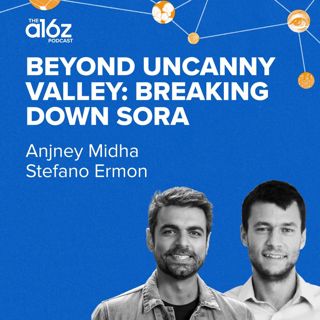
Beyond Uncanny Valley: Breaking Down Sora
In early 2024, the notion of high fidelity, believable AI-generated video seemed a distant future to many. Yet, a mere few weeks into the year, OpenAI unveiled Sora, its new state of the art text-to-video model producing videos of up to 60 seconds. The output shattered expectations – even for other builders and researchers within generative AI – sparking widespread speculation and awe.How does Sora achieve such realism? And are explicit 3D modeling techniques or game engines at play?In this episode of the a16z Podcast, a16z General Partner Anjney Midha connects with Stefano Ermon, Professor of Computer Science at Stanford and key figure at the lab behind the diffusion models now used in Sora, ChatGPT, and Midjourney. Together, they delve into the challenges of video generation, the cutting-edge mechanics of Sora, and what this all could mean for the road ahead.Resources: Find Stefano on Twitter: https://twitter.com/stefanoermonFind Anjney on Twitter: https://twitter.com/anjneymidhaLearn more about Stefano’s Deep Generative Models course: :https://deepgenerativemodels.github.ioStay Updated: Find a16z on Twitter: https://twitter.com/a16zFind a16z on LinkedIn: https://www.linkedin.com/company/a16zSubscribe on your favorite podcast app: https://a16z.simplecast.com/Follow our host: https://twitter.com/stephsmithioPlease note that the content here is for informational purposes only; should NOT be taken as legal, business, tax, or investment advice or be used to evaluate any investment or security; and is not directed at any investors or potential investors in any a16z fund. a16z and its affiliates may maintain investments in the companies discussed. For more details please see a16z.com/disclosures. Stay Updated:Find a16z on XFind a16z on LinkedInListen to the a16z Show on SpotifyListen to the a16z Show on Apple PodcastsFollow our host: https://twitter.com/eriktorenberg Please note that the content here is for informational purposes only; should NOT be taken as legal, business, tax, or investment advice or be used to evaluate any investment or security; and is not directed at any investors or potential investors in any a16z fund. a16z and its affiliates may maintain investments in the companies discussed. For more details please see a16z.com/disclosures. Hosted by Simplecast, an AdsWizz company. See pcm.adswizz.com for information about our collection and use of personal data for advertising.
24 Helmi 202434min
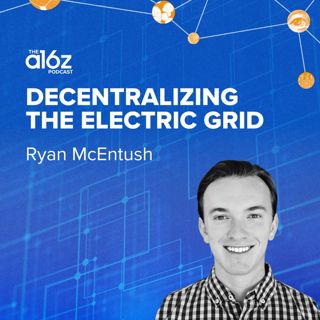
Fraying Wires: The Decentralization of the Electric Grid
The electric grid needs an update. In this explainer, a16z Partner Ryan McEntush discusses the escalating complexity of the grid, unveils its vulnerabilities, and traces the evolutionary path that has led us to this point. From the surging demands of AI to outdated infrastructure, we delve into the potential roles of cutting-edge technologies such as solar batteries, natural gas, and nuclear power in shaping the grid's future.Timestamps:(00:00) - Introduction(02:28) - The Need for Grid Modernization(04:43) - Understanding the Grid's Operation and Challenges(06:47) - The Complexity of Grid Management(08:31) - Increasing Outages and Volatility(11:49) - The Role of New Technologies(17:53) - The Potential and Limitations of Renewable Energy Sources(19:08) - Energy Storage Solutions(24:57) - The Future of Natural Gas and Nuclear Power(29:46) - The Impact of Policy on the Grid(31:47) - The Concept of a Smart Grid(34:04) - Decentralization of the Grid(36:57) - The Role of the Free Market in Grid ReliabilityResources: Find Ryan on Twitter: https://twitter.com/rmcentushRead Ryan’s latest articles: https://a16z.com/author/ryan-mcentushStay Updated: Find a16z on Twitter: https://twitter.com/a16zFind a16z on LinkedIn: https://www.linkedin.com/company/a16zSubscribe on your favorite podcast app: https://a16z.simplecast.com/Follow our host: https://twitter.com/stephsmithioPlease note that the content here is for informational purposes only; should NOT be taken as legal, business, tax, or investment advice or be used to evaluate any investment or security; and is not directed at any investors or potential investors in any a16z fund. a16z and its affiliates may maintain investments in the companies discussed. For more details please see a16z.com/disclosures. Stay Updated:Find a16z on XFind a16z on LinkedInListen to the a16z Show on SpotifyListen to the a16z Show on Apple PodcastsFollow our host: https://twitter.com/eriktorenberg Please note that the content here is for informational purposes only; should NOT be taken as legal, business, tax, or investment advice or be used to evaluate any investment or security; and is not directed at any investors or potential investors in any a16z fund. a16z and its affiliates may maintain investments in the companies discussed. For more details please see a16z.com/disclosures. Hosted by Simplecast, an AdsWizz company. See pcm.adswizz.com for information about our collection and use of personal data for advertising.
15 Helmi 202442min














